RBSE Solutions for Class 12 Maths Chapter 1 Relations and Functions Ex 1.4
Rajasthan Board RBSE Solutions for Class 12 Maths Chapter 1 Relations and Functions Ex 1.4 Textbook Exercise Questions and Answers.
Rajasthan Board RBSE Solutions for Class 12 Maths in Hindi Medium & English Medium are part of RBSE Solutions for Class 12. Students can also read RBSE Class 12 Maths Important Questions for exam preparation. Students can also go through RBSE Class 12 Maths Notes to understand and remember the concepts easily.
RBSE Class 12 Maths Solutions Chapter 1 Relations and Functions Ex 1.4
Question 1.
Determine whether or not each of the definition of * given below gives a binary operation. In the event that * is not a binary operation, give justification for this.
(i) On Z+, define * by a * b = a-b
Answer:
a*b = a - b, where a, b ∈ Z+, * is not binary operation.
Since, 3 - 2 = 1 ∈ Z+, but 2 - 3 = -1 ∉ Z+
(ii) On Z+, define * by a * b = ab
Answer:
Operation * is binary operation in Z+,
since 3*2 = 6 ∈ Z+, 2 × 3 = 6 ∈ Z+
(iii) On R, define * by a* b = ab2
Answer:
Operation * is binary operation in R,
since 3*4 = 3 × 42 = 48 ∈ R
and 4*3 = 4 × 32 = 32 = 36 ∈ R

(iv) On Z+, define * by a* b = |a - b|
Answer:
Operation * is a binary operation in Z+,
since a*b = |a - b|
2*3 = | 2 - 3 |
= | - 1 | = 1 ∈ Z+
and 3*2 = | 3 - 2 |
= | 1 | = 1 ∈ Z+.
(v) On Z+, define * by a* b = a
Answer:
Operation * is binary operation in Z+,
since 3*4 = 3 ∈ Z+
and 4*3 = 4 ∈ Z+
Question 2.
For each binary operation * defined below, determine whether * is binary, commutative or associative.
(i) On Z, define a * b = a - b
(ii) On Q, define a * b = ab + 1
(iii) On Q, define a * b = \(\frac{a b}{2}\)
(iv) On Z+, define a * b = 2ab
(v) On Z+, define a * b = ab
(vi) On R - {- 1}, define a * b = \(\frac{a}{b+1}\)
Answer:
Operation * is neither commutative nor associative,
since 3 - 2 = 1, 2 - 3 = - 1 ⇒ 3*2 ≠ 2*3
and (3*4)*5 = (3 -4)*5 = - 1 - 5 = - 6
(∵ According to definition )
and 3*(4*5) = 3*(4 - 5) = 3 * (- 1)
= 3 - (- 1) = 4
∴ (3*4)*5 ≠ 3*(4*5)

(ii) Operation * is commutative but not associative.
2*3 = 2.3 + 1 = 6 + 1 = 7,
3*2 = 3.2 + 1 = 6 + 1 = 7
⇒ 2*3 = 3*2
and (2*3)*4 = (2.3 + 1)*4
= 7*4 = 7 × 4 + 1 = 29
2*(3*4) = 2*(3.4 + 1)
= 2*(13) = 2.13 + 1 = 27
⇒ (2*3)*4 ≠ 2*(3*4)
(iii) In Q, binary operation * is defined by
a * b = \(\frac{a b}{2}\)
(a) a * b = \(\frac{a b}{2}\), b * a = \(\frac{b a}{2}\) = \(\frac{a b}{2}\)
∴ a * b = b * c
Thus, operation * is commutative.
(b)
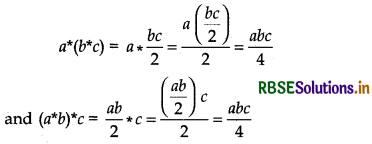
∴ a * (b * c) = (a * b) * a
∴ Operation * is associative.
Thus, operation * is commutative and associative.
(iv) Operation * on Z+ is defined by a*b = 2ab
(a) ∴ a*b = 2ab, b*a = 2ba = 2ab
⇒ a*b = b*a
Thus, operation * is commutative.

(b) a*(b*c) = a*(2bc) = 2a.2bc
(a*b)*c = 2ab*c = 22ab . c
∴ a*(b*c) ≠ (a*b)*c
∴ Operation * is not associative.
Thus, operation * is commutative but not associative.
(v) Operation * on Z+ is defined by a*b = ab
(a) a*b = ab, b*a = ba
∴ a*b ≠ b*a
So, operation * is not commutative.
(b) a*(b*c) = a*bc = a(bc)
(a*b)*c = ab*c = (ab)c = abc
∴ (a*b)*c ≠ a*(b*c)
So, operation * is not associative.
Thus, operation * is neither commutative nor associative.
(vi) On R - {- 1} operation * is defined by
a*b = \(\frac{a}{b+1}\)
(a) a * b = \(\frac{a}{b+1}\), b * a = \(\frac{b}{a+1}\)
a * b ≠ b * a
So, operation * is not commutative.
(b)
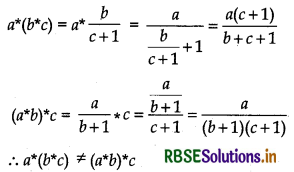
So, operation is not associative.
Thus, operation * is neither commutative nor associative.

Question 3.
Consider the binary operation A on the set {1, 2, 3, 4, 5} defined by a ∧ b = min [a, b}. Write the operation table of the operation ∧.
Answer:
Table for ∧
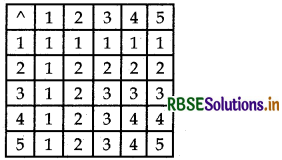
Question 4.
Consider a binary operation * on the set {1, 2, 3, 4, 5} given by the following multiplication table.
(i) Compute (2 * 3) * 4 and 2 * (3 * 4)
(ii) Is * commutative ?
(iii) Compute (2 * 3) * (4 * 5).
(Hint: Use the following table)
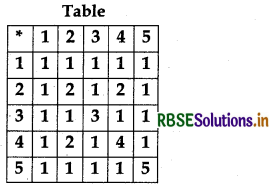
Answer:
(i) (2 * 3) * 4 = 1 * 4 = 1
(∵ 2 * 3 = 1)
2 * (3 * 4) = 2 * 1 = 1
(∵ 3 * 4 = 1)
(ii) 2 * 4 = 2, 4 * 2 = 2 ⇒ 2 * 4 = 4 * 2
Yes, * is commutative.
(iii) (2 * 3) * (4 * 5) = (1 * 1) = 1

Question 5.
Let *' be the binary operation on the set {1, 2, 3, 4, 5} defined by a*' b = H.C.F. of a and b. Is the operation *' same as the operation * defined in question 4 above ? Justify your answer.
Answer:
Given set is {1, 2, 3, 4, 5}
a*' b = H.C.F. of a and b. Table for *' is as follows :
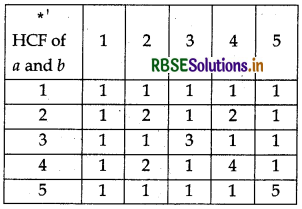
This table is same as given is question 4.
Thus, operation *' is same as operation * as given in Q. 4 above.
Question 6.
Let * be the binary operation on N given by a * b = L.C.M. of a and b. Find
(i) 5 * 7,20 * 16
(ii) Is * commutative ?
(iii) Is * associative ?
(iv) Find the identity of * in N.
(v) Which elements of N are invertible for the operation * ?
Answer:
(i) 5*7 = LCM of 5 and 7 = 35
20*16 = LCM of 20 and 16 = 80
(ii) Yes, operation * is commutative,
since a*b = LCM of a and b
or b*a = LCM of b and a
We know that LCM of a and b in set M of natural numbers = LCM of b and a
⇒ a*b = b*a
As 2*6 = LCM of 2 and 6
6*2 = LCM of 6 and 2 = 6
Thus, 2*6 = 6*2
(iii) Yes, * is associative,
since (a*b)*c = (LCM of a and b)*c
= LCM of a and c
And a*(b*c) = a*(LCM of b and c)
= LCM of a and b and c
∴ (a*b)*c = a*(b*c)
As (2*3)*4 = (LCM of 2 and 3 LCM)*4 = 6*4
= LCM of 6 and 4 = 12
2*(3*4) = 2*(LCM of 3 and 4)
= 2*12
= LCM of 2 and 12 = 12.
Thus, (2*3)*4 = 2*(3*4)
(iv) * Identity element of * operation is 1.
∵ 1*a = a* 1 = a, [Since, LCM of 1 and a = a]
(v) N*N → N, binary operation * is defined as a*b = LCM of a, b
If a = 1, b = 1, a*b = 1
⇒ 1*1 = 1
⇒ 1 is invertible for * operation.

Question 7.
Is * defined on the set {1, 2, 3, 4, 5} by a*b = L.C.M. of a and b a binary operation? Justify your answer.
Answer:
* is not a binary operation,
since 3*4 = LCM of 3 and 4
= 12 ∉ {1, 2, 3, 4, 5}
Question 8.
Let * be the binary operation on N defined by a * b = H.C.F. of a and Is * commutative ? Is * associative ? Does there exists identity for this binary operation on N ?
Answer:
(i) Yes, * is commutative.
a*b = HCF of a and b
and b*a = HCF of b and a
∵ HCF of a and b = HCF of b and a
Example:
2*3 = HCF of 2 and 3 = 1
3*2 = HCF of 3 and 2 = 1
∴ 2*3 = 3*2

(ii) Yes * is associative, since
(a*b)*c = (HCF of a and b)*c
= HCF of a and b and c
= HCF of a, b, c
And a*(b*c) = a*(HCF of b and c)
= HCF of a and b and c
= HCF of a, b and c
∴ (a*b)*c = a*(b*c)
Example: (2*3)*4 = (HCF of 2 and 3)*4
= HCF of 1 and 4
= 1
2*(3*4) = 2*(HCF of 3 and 4)
= HCF of 2 and 1
= 1
∴ (2*3)*4 = 2*(3*4)
(iii) There is no identity element in N for binary operation *.
Thus, identity element does not exist for * operation in N.
Question 9.
Let * be a binary operation on the set Q of rational numbers as follows:
(i) a * b = a - b
(ii) a * b = a2 + b2
(iii) a * b = a + ab
(iv) a * b = (a - b)2
Find which of the binary operations are commutative and which are associative.
Answer:
(i) Operation * is not commutative,
since a*b = a - b and b * a = b - a
∵ a - b ≠ b - a ⇒ a*b ≠ b*a
Example:
2 - 3 = - 1 and 3 - 2 = 1 ⇒ 2 - 3 ≠ 3 - 2
and operation * is not associative,
since (a*b)*c = (a - b)*c = a - b - c
and a*(b*c) = a*(b - c) = a - (b - c)
= a - b + c
∵ a - b - c ≠ a - b + c
⇒ (a*b)*c ≠ a*(b*c)
Example:
(3*4)*5 = (3 - 4)*5
= - 1*5 = - 1 - 5 = - 6
and 3*(4*5) = 3*(4 - 5)
= 3*(- 1)
= 3 - (- 1) = 3 + 1 = 4
∴ (3*4)*5 ≠ 3*(4*5)
(ii) Operation * is commutative, since
a*b = a2 + b2 and b*a = b2 + a2
∴ a2 + b2 = b2 + a2 ⇒ a*b = b*a
Example:
2*3 = 22 + 32 = 4 + 9 = 13
3*2 = 32 + 22 = 9 + 4 = 13
∴ 2*3 =3*2
a*b = a2 + b2 is not associative,
since (a*b)*c = (a2 + b2)*c
= (a2 + b2)2 + c2
= a4 + b4 + 2a2b2 + c2
and a*(b*c) = a*(b2 + c2) = a2 + (b2 + c2)2
= a2 + b4 + c4 + 2b2c2
∵ a4 + b4 + 2a2b2 + c4 ≠ a2 + b4 + c4 + 2b2c2
⇒ (a*b)*c ≠ a* (b*c)
So * is not associative.
Example:
(2*3) * 4 = (22 + 32)*4 = 13*4
= 132 + 42
= 169 + 16 = 185
and 2*(3*4) = 2*(32 + 42)
= 2*(9 + 16)
= 2*25
= 22 + 252
= 4 + 625 = 629
∴ 185 ≠ 629 ⇒ (2*3)*4 ≠ 2*(3*4)

(iii) Operation * is neither commutative nor associative,
since a*b = a + ab
and b*a = b + ba = b + ab
∵ a + ab ≠ b + ab ⇒ a*b ≠ b*a
Example:
2*3 = 2 + 2.3 = 2 + 6 = 8
and 3*2 = 3 + 3.2 = 3 + 6 = 9
8 ≠ 9 ⇒ 2*3 ≠ 3*2
For associativity
(a*b)*c = (a + ab)*c
= a + ab + (a + ab)c
= a + ab + ac + abc
and a*(b*c) = a*(b + bc)
= a + a(b + bc)
= a + ab + abc
∵ a + ab + ac + abc ≠ a + ab + abc
⇒ (a*b)*c ≠ a*(b*c)
Thus, * is not associative.
Example:
(2*3) *4 = (2 + 2 3)*4
= 8*4 = 8 + 8.4 = 40
and 2*(3*4) = 2*(3 + 3.4) = 2*15
= 2 + 215 = 32
40 ≠ 32
⇒ (2*3)*4 ≠ 2*(3*4)
(iv) a*b = (a - b)2, operation * is commutative.
Since (a*b) = (a - b)2 = (b - a)2 = b*a
⇒ (a*b) = b*a
Example:
(2*3) = (2 - 3)2 = (- 1)2 = 1
(3*2) = (3 - 2)2 = 12 = 1
⇒ 2*3 = 3*2
Operation * is not associative.
(a*b)*c = (a - b)2*c
= (a2 + b2 - 2ab)*c
= (a2 + b2 - 2ab - c)2
and a*(b*c) = a*(b - c)2
= a*(b2 + c2 - 2 bc)
= (a - b2 - c2 + 2bc)2
∵ (a2 + b2 - 2ab - c)2 ≠ (a - b2 - c2 + 2bc)2
⇒ (a*b)*c ≠ a*(b*c)
Example:
(2*3)*4 = (2 - 3)2*4
= 1*4 = (1 - 4)2 = 9
and 2*(3*4) = 2*(3 - 4)2 = 2*1
= (2 - 1)2 = 1
⇒ (2*3)*4 ≠ 2*(3*4)
∴ Operation * is not associative.

(v) a*b = \(\frac{a^{b}}{4}\)
Operation * is not commutative and associative.
Since a*b = \(\frac{a^{b}}{4}\) and b*a = \(\frac{b^{a}}{4}\)
∵ \(\frac{a^{b}}{4}\) ≠ \(\frac{b^{a}}{4}\)
⇒ a*b ≠ b*a
Thus, operation * is not commutative.
Example:
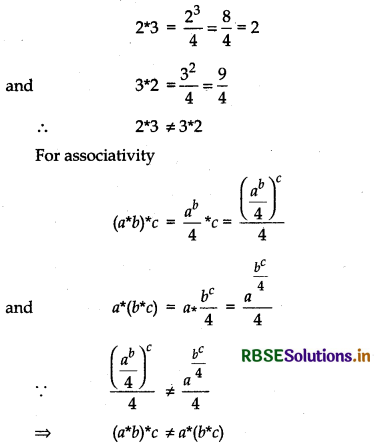
Thus, operation * is not associative.
Example:
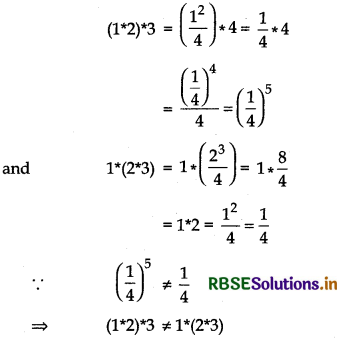
(vi) * is neither commutative nor associative.
Since a*b = ab2 and b*a = ba2
⇒ a*b ≠ b*a
Example: 2*3 = 2.32 = 18
3*2 = 3.22 = 12
⇒ 2*3 * 3*2
For associativity
(a*b)*c = (ab2)*c
= (ab2)c2 = ab2c2
And a*(b*c) = a*(bc2) = a (bc2)2 = ab2c4
∵ ab2c2 ≠ ab2c4
⇒ (a*b)*c ≠ a*(b*c)
Thus, * is not associative.
Example:
(2*3)*4 = (2.32)*4 = 18*4
= (18.42) = 18 × 16 = 288
And 2*(3*4) = 2*(3.42) = 2*48 = 2.482
= 2 × 2304 = 4608
∵ 288 ≠ 4608
⇒ (2*3)*4 ≠ 2*(3*4)

Question 10.
Find which of the operations given above in Q. 9, has identity.
Answer:
(i) a*b = a - b
If, e is identity element for *, then
a*e = a - e ≠ a and e*a = e - a ≠ a
∴ a - e ≠ e - a ⇒ a*e ≠ e*a ≠ a
Thus, identity element e does not exist, i.e., it is not an identity element of any element.
(ii) a*b = a2 + b2
Let e be identity element, then
∴ a*e = a2 + e2 ≠ a and e*a = e2 + a2 ≠ a
∴ a*e = e*a ≠ a
Thus, e does not exist, i.e., no element has identity element.
(iii) a*b = a + ab
Let e is an identity element, then
a*e = a + ae ≠ a, e*a = e + ea ≠ a
∴ a*e ≠ e*a ≠ a
Thus, identity element does not exist.
(iv) a*b = (a - b)2
Let e be an identity element, then
a*e = (a - e)2 ≠ a and e*a = (e - a)2 ≠ a
∴ a*e = e*a = a
Thus, identity element e does not exists.
(v)
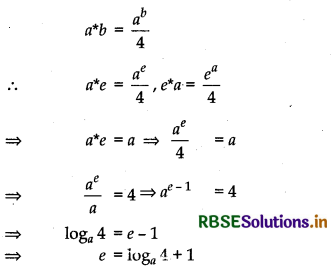
Thus, identity element e does not exists.
(vi) a*b = ab2
Let e be an identity element, then
a*e = ae2 ≠ a, e*a = ea2 ≠ a
∴ a*e ≠ e*a ≠ a.
Thus identity element e does not exist.

Question 11.
Let A = N × N and * be the binary operation on A defined by
(a, b)* (c,d) = (a + c,b + d)
Show that * is commutative and associative. Find the identity element for * on A, if any.
Answer:
(i) If (a, b) ∈ A and (c, d) ∈ A then a, b, c, d ∈ N
(a, b)*(c, d) = (a + c, b + d) ∈ A
[∵ (a + c) ∈ N, (b × d) ∈ N
(a, b)*(c, d) = (a + c, b + d)
= (c + a, d + b)
[∵ a + c = c + a and b + d = d + b]
= (c, d)*(a, b), (Commutative)
Again [(a, b)*(c, d)]*(e, f)
= (a + c, b + d)*(e,f)
= [(a + c) + e, (b + d) + f]
= [a + (c + d), b + (d + f)]
= (a, b)*(c + e, d +f)
= (a, b)*[(c, d)*(e,f)] (Associative)
(ii) (a, b)*(0, 0) = (a + 0, b + 0) = (a, b)
But (0, 0) ∉ A, since 0 ∉ N
Thus, in set A, for binary operation * no identity element exists.
Question 12.
State whether the following statements are true or false. Justify.
(i) For an arbitrary binary operation * on a set N, a * a = d ∀ a ∈ N.
(ii) If * is a commutative binary operation on N, then a* (b* c) = (c*b)* a
Answer:
Here, binary operation * is defined on set
a*a = a, ∀ a ∈ N
(i) Here, for operation * only one element a is used, so this statement is false.
(ii) Operation * is commutative on set of real numbers i.e.,
b*c = c*b
⇒ (c*b)*a = (b*c)*a = a*(b*c)
∴ a*(b*c) = (c*b)*a
Thus, statement is true.

Question 13.
Consider a binary operation * on N defined as a * b = a3 + b3. Choose the correct answer.
(A) Is * both associative and commutative ?
(B) Is * commutative but not associative ?
(C) Is * associative but not commutative ?
(D) Is * neither commutative nor associative ?
Answer:
Here, binary operation * is defined on set N such that
a*b = a3 + b3 ∀ a, b ∈ N
= b3 + a3 = b*a
∴ a*b = b*a
Thus, operation * is commutative.
Again a*(b*c) = a*(b3 + c3)
= a3 + (b3 + c3)3
and (a*b)*c = (a3 + b3)*c
= (a3 + b3)3 + c3
Clearly, (a*b)*c ≠ a*(b*c)
Thus operation * is not associative.
∴ * is commutative but not associative.
Thus, option (B) is correct.

- RBSE Class 12 Maths Notes Chapter 13 Probability
- RBSE Class 12 Maths Notes Chapter 12 Linear Programming
- RBSE Class 12 Maths Notes Chapter 11 Three Dimensional Geometry
- RBSE Class 12 Maths Notes Chapter 10 Vector Algebra
- RBSE Class 12 Maths Notes Chapter 9 Differential Equations
- RBSE Class 12 Maths Notes Chapter 8 Application of Integrals
- RBSE Class 12 Maths Notes Chapter 7 Integrals
- RBSE Class 12 Maths Notes Chapter 6 Application of Derivatives
- RBSE Class 12 Maths Notes Chapter 5 Continuity and Differentiability
- RBSE Class 12 Maths Notes Chapter 4 Determinants
- RBSE Class 12 Maths Notes Chapter 3 Matrices